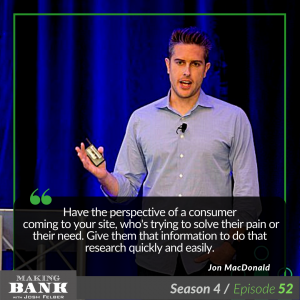How Empathy Impacts Business
with Jon MacDonald
Video:
Audio:
with guest Jon MacDonald #MakingBank S4E52
When many of us think of business, we usually first think of money. Whether its investments or profits, business is the practice of generating and spending money. It’s about the data, the bottom line, the target goals. So, the very idea that a skill as “soft” as empathy could impact these numbers seems baffling. Why does empathy matter? Because behind the analytics are people who make decisions not always just based on the rationale but on emotional responses. If entrepreneurs apply empathy to their business or appear empathetic towards the consumer, they can better understand, convert, and keep that consumer—the consumer who influences those numbers.
Understanding the Consumer
In episode 52 of season 4 of the Making Bank podcast, conversion rate optimization expert Jon MacDonald speaks about understanding the consumer. Having run a successful conversion rate optimization firm, The Good, for over ten years, MacDonald has specialized in being considerate of the mental state of the consumer. He says how oftentimes, large companies forget the perspective of the buyer: that they are looking for something to tend to their need or pain.
By placing yourself in the shoes of the consumer, you can start to see your site or your business from their viewpoint. What does your business look like to a consumer and not to you? How would a consumer navigate your site or store? What are they thinking and feeling as they do so? Are you doing something that turns them away? Asking yourself these questions can help you better shape your business for the consumer experience. In order to even begin reflecting, you must practice your empathy towards the other side of the business.
Simply put: ask not what the consumer can do for you, but what you can do for the consumer.
Converting the Consumer
MacDonald also discusses how empathy influences the business. When an entrepreneur places his or her needs first, a consumer can often tell, whether consciously or subconsciously.
When a business does not value the buyer’s experience, it exudes into all areas of the interaction. Whether its pop ups, poor customer service, or vague descriptions of services, any act that aggressively tries to convert the consumer has the opposite effect. As someone searches of help, they don’t want to be bombarded with pop ups. They don’t want to be harassed by the site, just as they wouldn’t want to be harassed as they enter a retail store. This bombardment can turn people away from your business outright, or in the very least, plant a seed of doubt in their mind. Even though businessowners must always think of their site, store, or service, brandishing this reality in an obvious manner sours a consumer. Before utilizing a highly abrasive tactic to convert people to buyers, ask yourself if you would be comfortable experiencing it from another business. This reflection returns to the same and simple concept: consider the mindset of the consumer.
The role of empathy also effects how people research your business. If your site speaks mostly on your business—as opposed to your products—a potential buyer may find themselves frustrated and click off. As MacDonald says, people are coming to your site to see if your products can help them, not to first read “About Us” or your mission statement. Yes, you could include that information somewhere, but don’t make the webpage all about you. If you shift it to focus solely on your products, the potential buyer will discover how your product can help them remedy a need or a pain. If you gently walk the consumer through your services, you will be pushing them “further down your funnel.” As MacDonald believes, this will eventually convert them. If you can improve your conversion rate, you will also increase your profits.

Keeping the Consumer
As with the previous two sections, keeping your consumer in mind as you evolve will help you keep them as buyers. Once they have converted, they understand you as a solution to their problems. As your business grows, it may be tempting to care less about what the individual thinks. Besides, as your name grows, more people will flock to it through marketing and word of mouth. Why should a hundred-million-dollar business care about one person? Surely an enormous enterprise such as Amazon can do whatever it wants.
In theory, perhaps. But as MacDonald points out, “Amazon is just the thousand-pound gorilla, but they follow all the conventions.” In this quote, he is specifically addressing how they follow all of the website conventions with which we have all grown up. However, he is also saying that they follow the conventions to make the experience easier on the consumer. Now, this idea may not directly connect to empathy, but it still follows the basic foundation upon which empathy stands: the idea of considering the consumer.
While your business grows and more cash flows into your accounts, think of your buyers. Now that you may have more capital, think about investing in services and opportunities that improve the consumer interactions. Not only will this feed into their loyalty, but it encourages more people to convert.
In examining Amazon again, particularly Amazon Prime services, they still offer 1-3 day shipping. Now that they are a massive conglomerate, they don’t need to provide the same convenience as before, and still retain a percentage of customers. However, part of what grew them into a massive company was their consumer experience. Yes, other sites offer shipping, but Amazon upped the bar—shipping the next day instead of in 3 weeks? Sign me up! And that’s what millions of people have done.
Again, the business is not necessarily an engine for empathy. However, they still considered the pain of shipping for consumers and discovered a way to solve it. As they’ve grown, they’ve only increased their ability to deliver packages faster, always thinking of the perspective of the buyer.
While it may seem ridiculous, empathy does allow businessowners to first understand the consumer, convert them, and keep them.
Topics
- Accelerated Learning
- Artificial Intelligence
- Become Present
- Blockchain
- Branding
- Business
- Education
- Entrepreneurship
- Family
- Finance
- Health
- Health & Wellness
- Internet Marketing
- Investing
- Leadership
- Lifecoach
- Marketing
- Negotiation
- Performance
- Productivity
- Publicity
- Real Estate
- Sales
- Sales Success Habits
- Video Marketing
- Writing
















